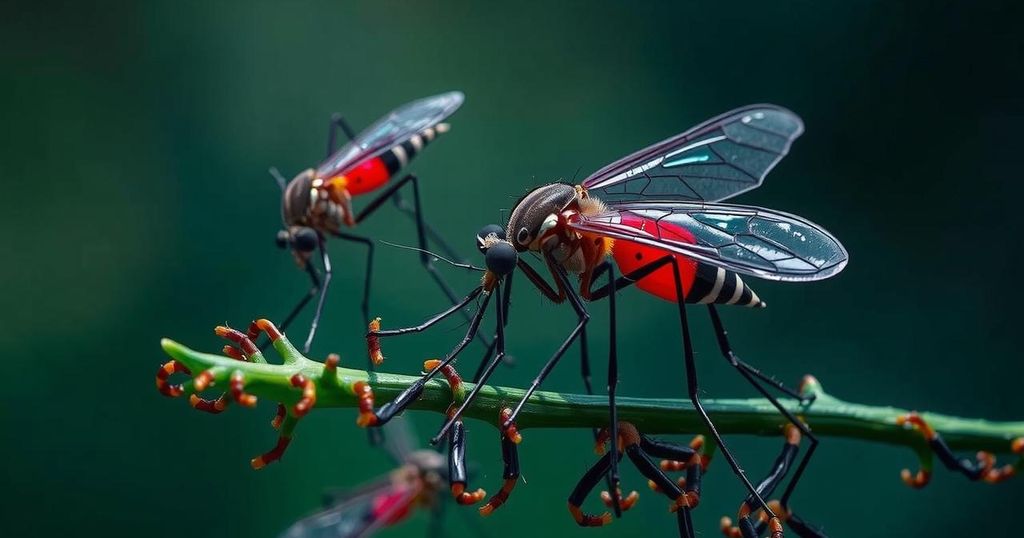Weather
ABYEI, AFRICA, COTE D ’ IVOIRE, CÔTE D ’ IVOIRE, DISEASE, DISPLACEMENT, FLOODS, INTERNALLY DISPLACED PERSONS (IDPS, MALNUTRITION, MINISTRY OF HEALTH, OCHA, SEXUAL VIOLENCE, SOUTH SUDAN, SUDAN, UNITED NATIONS, UNITED NATIONS OFFICE FOR THE COORDINATION OF HUMANITARIAN AFFAIRS, WHO
Oliver Grayson
0 Comments
UN Warns of Rising Malaria Cases Amidst Flooding in South Sudan
The United Nations has cautioned about a potential rise in malaria cases in South Sudan due to severe flooding impacting 1.4 million people and causing significant food insecurity. This situation has strained the nation’s health system, which is already burdened with high malaria incidences. The introduction of the R21 malaria vaccine provides hope for relief, complemented by ongoing efforts to distribute treated mosquito nets for prevention.
The United Nations has issued a grave warning regarding a potential increase in malaria cases in South Sudan, exacerbated by severe flooding that has impacted approximately 1.4 million individuals, leading to the displacement of over 379,000 people amid growing food insecurity. This situation has been described by humanitarian agencies as critical, with South Sudan experiencing its worst flooding in decades, primarily in northern regions, affecting 43 counties and the contested Abyei area. The surge in malaria has placed considerable strain on the already fragile health system in flood-affected regions. Earlier in the year, South Sudan, alongside Côte d’Ivoire, became one of the first nations to administer the new R21/Matrix-M malaria vaccine, introduced in May for children vulnerable to malaria. The government received more than 645,000 doses of this vaccine, which were allocated to 28 counties identified as having the highest malaria burden, with plans in progress for a nationwide scale-up. South Sudan has one of the highest incidences of malaria worldwide, with estimates indicating an alarming 7,680 new cases and 18 deaths occurring daily due to this mosquito-borne parasitic disease. Notably, malaria is the leading cause of mortality among children in the country, with 2.8 million pediatric cases and 6,680 reported deaths in 2022. Healthcare professionals are optimistic that the introduction of the R21 malaria vaccine will significantly alter the current dire situation. The government frequently incurs large expenditures on antimalaria medications and testing materials. According to the Malaria Consortium, preventive measures remain crucial; approximately 85% of the at-risk population was reportedly covered by the recommended prevention strategy of utilizing treated mosquito nets in 2023. Continued advocacy for these nets remains pivotal in the fight against malaria in the region.
The context of this alarming situation in South Sudan highlights the interplay between climate change and public health crises. The nation is particularly susceptible to the effects of extreme weather patterns, such as flooding, which not only displace populations but also disrupt health services and exacerbate existing vulnerabilities. Malaria, a disease that poses a significant threat to public health, especially among children, is prevalent in the region, leading to high incidences of disease and mortality. The introduction of new vaccines like the R21/Matrix-M represents a critical advancement in malaria prevention efforts amid these ongoing challenges.
In conclusion, the warning from the United Nations regarding the anticipated rise in malaria cases in South Sudan underscores the urgent need for humanitarian and healthcare interventions in response to the devastating effects of flooding and food insecurity. The introduction of the R21 malaria vaccine offers hope for improved outcomes among the at-risk population, while ongoing efforts to distribute mosquito nets remain essential in preventing transmission. Continued support and commitment to addressing the health needs of the most vulnerable populations in South Sudan are imperative as challenges from both climate change and infectious diseases persist.
Original Source: newscentral.africa




Post Comment